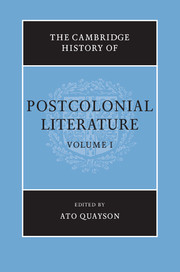Book contents
- Frontmatter
- 1 Introduction: postcolonial literature in a changing historical frame
- 2 Postcolonial fictions of slavery
- 3 Postcolonialism and travel writing
- 4 Missionary writing and postcolonialism
- 5 Postcolonial auto/biography
- 6 Orality and the genres of African postcolonial writing
- 7 Canadian literatures and the postcolonial
- 8 Postcolonialism and Caribbean literature
- 9 Postcolonialism and Arab literature
- 10 Postcolonialism and postcolonial writing in Latin America
- 11 Postcolonial writing in South Africa
- 12 Postcolonial literature in Southeast Asia
- 13 Postcolonial South Asian poetry
- 14 Postcolonial writing in India
- 15 Postcolonial writing in Australia and New Zealand
- 16 Indigenous writing in Canada, Australia and New Zealand
- 17 Postcolonial writing in Ireland
- 18 Postcolonial writing in Britain
- 19 Postcolonial writing in France
- 20 Postcolonial writing in Germany
- References
7 - Canadian literatures and the postcolonial
Published online by Cambridge University Press: 28 January 2012
- Frontmatter
- 1 Introduction: postcolonial literature in a changing historical frame
- 2 Postcolonial fictions of slavery
- 3 Postcolonialism and travel writing
- 4 Missionary writing and postcolonialism
- 5 Postcolonial auto/biography
- 6 Orality and the genres of African postcolonial writing
- 7 Canadian literatures and the postcolonial
- 8 Postcolonialism and Caribbean literature
- 9 Postcolonialism and Arab literature
- 10 Postcolonialism and postcolonial writing in Latin America
- 11 Postcolonial writing in South Africa
- 12 Postcolonial literature in Southeast Asia
- 13 Postcolonial South Asian poetry
- 14 Postcolonial writing in India
- 15 Postcolonial writing in Australia and New Zealand
- 16 Indigenous writing in Canada, Australia and New Zealand
- 17 Postcolonial writing in Ireland
- 18 Postcolonial writing in Britain
- 19 Postcolonial writing in France
- 20 Postcolonial writing in Germany
- References
Summary
What is now Canada and Quebec remains marked by unequal relations of difference initiated by the advent of European explorers and settlers. Instead of assuming any perceived end of coloniality such as Canadian Confederation in 1867, legislative independence with the Statute of Westminster in 1931, the establishment of Canadian Citizenship in 1947, or the patriation of the Canadian Constitution in 1982, this chapter reads the postcolonial spaces of Canada as persisting in ongoing relations of power, dominance, contest, dialogue and negotiation in a field originally constituted by the moment of colonial contact. Initial settler relationships with indigenous populations, with their respective European imperial centres, and with other settlers (including here the colonies to the south, which in turn will become an imperial power) are complicated by other diasporas arriving later from everywhere on the globe, altering any previous emotional, social, economic, political and symbolic geographies of North America.
The inclusion of black, indigenous and other minority and subaltern writing from Canada appears uncontested in postcolonial studies, although this corpus certainly requires more visibility and discussion with attention to Canadian specificity. Theorists including Stephen Slemon, Linda Hutcheon, Donna Bennett, Diana Brydon and Cynthia Sugars have also argued, however, for the importance of other writing from settler nation states like Canada for postcolonial studies. That view is in keeping with the earlier suggestion by Ashcroft, Griffiths and Tiffin in The Empire Writes Back that the term ‘postcolonial’ should ‘cover all the culture affected by the imperial process from the moment of colonization to the present day’.
- Type
- Chapter
- Information
- The Cambridge History of Postcolonial Literature , pp. 171 - 214Publisher: Cambridge University PressPrint publication year: 2012

